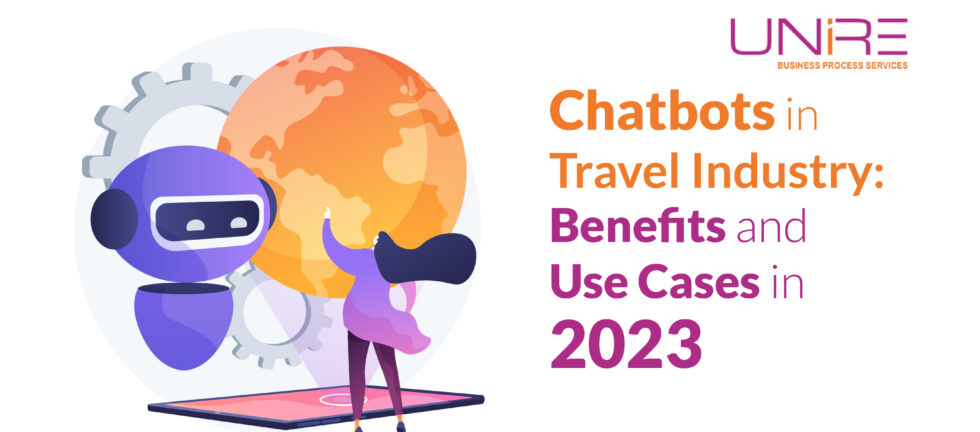Right from 190.8 million US dollars in 2016 to 1.25 billion US dollars in 2025, the growth of the chatbot market is only increasing, thanks to rapid AI integration across industries.
With the focus on travel & hospitality in delivering exceptional customer services while still saving time and resources, the demand for chatbot for travel industry has flourished with 87% of users choosing to interact with chatbots just to save time.
These intelligent virtual assistants are actually revolutionizing the way travel companies interact with their customers, providing personalized and efficient support throughout the customer journey.
In this blog, we will explore the top benefits and use cases of chatbots in travel industry. Let’s travel our way out to technology.

Benefits of Chatbot in Travel Industry
Enhanced Customer Service
By leveraging natural language processing and machine learning algorithms, chatbots can understand customer queries and provide instant responses, 24/7. This capability eliminates the need for customers to wait for human agents and ensures that they receive quick and accurate assistance, resulting in improved customer satisfaction.
Increased Efficiency
With the ability to handle multiple inquiries simultaneously, chatbots significantly increase operational efficiency. They can swiftly respond to commonly asked questions, such as travel itineraries, booking availability, or flight status, saving time for both customers and employees. The ability of the chatbots to automate routine tasks allow the human resources to concentrate on more value-added and complex activities.
Personalized Recommendations
Travel chatbots have become adept at understanding customer preferences and delivering personalized recommendations. By analyzing user data and previous interactions, chatbots can suggest tailored travel options, such as destination recommendations, hotel choices, or tour packages. This personalized approach enhances the customer experience, making them feel valued and understood.
Seamless Booking Experience
Chatbots simplify the booking process by offering a seamless and user-friendly interface. Customers can search for booking opportunities, compare prices, and make reservations directly through the chatbot interface. This eliminates the need for customers to navigate through multiple websites or applications, enhancing convenience and reducing friction in the booking process.
Top Use Cases of Chatbots in Travel Industry
Search for Booking Opportunities
Chatbots can assist customers in finding the best travel options based on their preferences, including flights, hotels, car rentals, and activities. For instance, the travel chatbot example of Expedia’s chatbot is that it allows users to search for flights and hotels by simply typing or speaking their requirements, providing a convenient and efficient search experience.
Manage Inquiries
Travel chatbots excel in handling inquiries related to travel policies, visa requirements, travel restrictions, and more. By providing accurate and up-to-date information, chatbots assist customers in making informed decisions. KLM Royal Dutch Airlines chatbot, for example, promptly answers customer queries about flight schedules, baggage policies, and seat availability.
Complete Reservations
Chatbots enable customers to complete reservations directly within the chat interface, eliminating the need for customers to visit external websites or call customer support. Booking.com’s chatbot allows users to book hotels effortlessly, simplifying the reservation process and enhancing convenience.
Cross-sell
Chatbots can effectively cross-sell additional services to customers, such as travel insurance, airport transfers, or upgrades. By analyzing customer preferences and purchase history, chatbots can make relevant suggestions, enhancing revenue opportunities for travel companies. For instance, the chatbot of Delta Air Lines offers customers the option to upgrade their seats or purchase additional services during the booking process.
Manage Booking
Travel chatbots assist customers in managing their bookings, such as changing flight dates, selecting seats, or adding special requests. These self-service capabilities empower customers, reducing the need for manual interventions and streamlining the overall booking management process.
Manage Cancellations
In the event of trip cancellations or changes, chatbots can guide customers through the process, providing information on refund policies, rescheduling options, or alternative travel arrangements. This proactive support ensures a smooth and hassle-free experience during unforeseen circumstances.
Manage Luggage Inquiries
Chatbots can handle inquiries related to baggage allowances, restrictions, and lost or delayed luggage, and provide real-time updates. This relieves the burden on customer support teams and helps travelers stay informed throughout their journey.
Collect Customer Reviews
Chatbots can prompt customers to provide feedback and reviews, enabling travel companies to gather valuable insights and improve their services. By automating the review collection process, chatbots facilitate customer engagement and assist in maintaining high service standards.
Future of Travel Chatbots
As technology continues to advance, travel chatbots will become even more sophisticated and intelligent. The integration of artificial intelligence, machine learning, and natural language processing will enable chatbots to understand human emotions, provide empathetic responses, and deliver highly personalized experiences. Voice-enabled chatbots, powered by voice recognition technology, will offer a hands-free and seamless interaction, further enhancing convenience for travelers.
Unire: Streamlining Travel Back Office Operations
To fully capitalize on the potential of travel chatbots, companies need a robust back office operations management system. This is where Unire, a leading travel back office management company, comes into play. With their expertise in managing complex back office operations for medium and large-sized companies, Unire can help businesses seamlessly integrate chatbot technology into their existing systems. By automating repetitive tasks, optimizing processes, and providing comprehensive analytics, Unire enables travel companies to enhance their operational efficiency, reduce costs, and deliver exceptional customer experiences with the help of smooth travel back office management.
Conclusion
Travel chatbots have emerged as game-changers in the travel industry, transforming the way companies interact with their customers. With benefits such as enhanced customer service, increased efficiency, personalized recommendations, and seamless booking experiences, chatbots offer immense value to travel companies seeking to streamline their back-office operations.
Further reading – Why Outsource Your Business Travel Management: 10 Benefits

